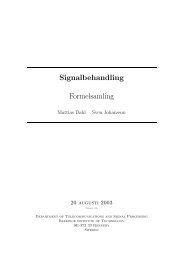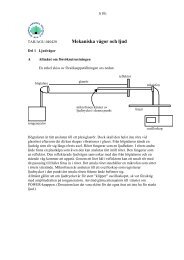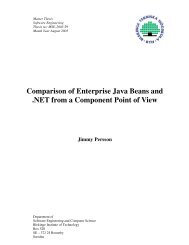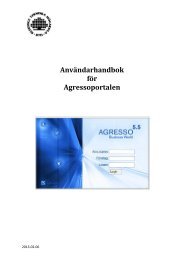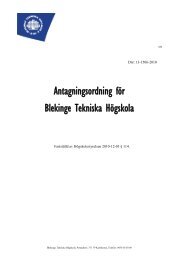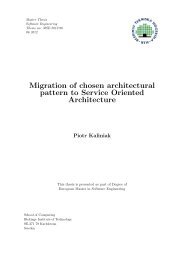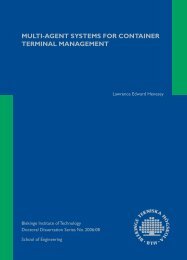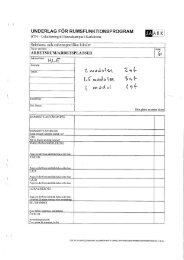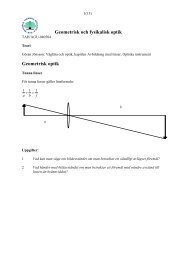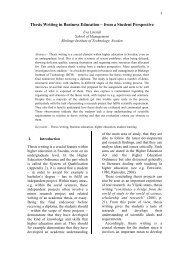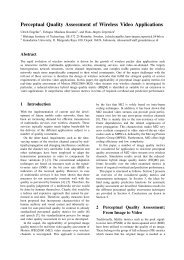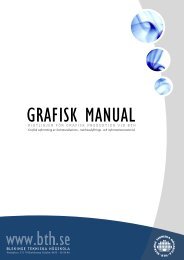contextual rather than developing general rules of practices. The view of the importance ofunderstanding the social and historical context of reality and thought is also supported bySandercock (op.cit.) in her writings on post-modern planning.“Whatever the reasons for the shift in emphasis; a change within planning itself, or influence of a shiftin the change of thinking on a wider front, the importance of public participation and an effort inunderstanding the context and preconditions has achieved widespread acknowledgment and acceptancein planning circles.”3.2.1 Rationality, integration and contextWhen reviewing the planning theory literature, a handful of concepts recur in the planningdiscussions that were regarded as particularly relevant for the <strong>SEA</strong> discourse 6 and deserved aclose examination of their meaning and their relevance to planning. These are: Rationality,Integration and Context.The term ‘rationality’ appears through the examination of <strong>SEA</strong> and planning literatureand it becomes clear that term has different interpretations. The term in relation to decisionmaking has its origins in the field of policy analysis and strongly influenced by the early workof Herbert Simon (1945) whose research of operational administrative decisions stressedsynoptic analysis, i.e. a comprehensive or general approach of the whole and its components,regarding decision making as the means of identifying the best possible course of action.Simon identified certain factors as constraints of rationality, e.g. resources, information andtime that are available for making decisions which he terms ‘bounded rationality’. Whenapplied to planning, Hudson (1979) provides a definition of the traditional understanding ofrationalistic planning, i.e. as a planning process including the following four elements: goalsetting; identification of policy alternatives; evaluation of means against ends andimplementation of decisions. In her examination of <strong>SEA</strong> and decision making processesKørnøv (1999) applies the distinction between substantive rationality; i.e. rationality of theoutcomes of the process and procedural rationality; i.e. rationality of the process itself. Thisentails that when referring rationality in decision making it can apply either to the one or bothof these elements and a rational procedure does not automatically lead to a rational decision.Rydin (2003) argues that in the case of environmental planning three main sources ofrationality are used to legitimate policy and decisions, scientific, economic and communicative. Shealso highlights the differences in which those are applied between substantive and proceduralrationality. Understanding the rationality on which the national planning system is based is ofdirect relevance for understanding the procedural framework for the implementation of the<strong>SEA</strong> directive and will be addressed in the national overviews in the following proceedingchapters.Environmental integration in planning is one of the main objectives of the <strong>SEA</strong> directiveand of <strong>SEA</strong> application generally. The demand on integration of environmental aspects inplanning forms a part of a broader challenge to planning for greater environmentalconsideration, e.g. as a part of the demands on sustainable development which has becomeintegrated into much planning work in recent years. On the basis of the strategy work carriedout during the last decade in the field of planning at the international, European and nationallevel, it can be concluded that there are great expectations of the achievement of integrating6 Discourse means either ‘written or spoken communication or debate’ or ‘a formal discussion or debate’.Compact Oxford Dictionary, Thesaurus and Wordpower Guide [2001], Oxford University Press, New York.36
aspects of environmental consideration and sustainability principles into planning practice.Integration and sustainable development are reflected in international agreements, Europeanstrategy documents, national sustainability strategies, planning documents at regional level, aswell in planning documents and several sustainability initiatives (e.g. co-operation betweenmunicipalities or groups at the local level in target or pilot projects, Agenda 21 work etc).However, this does not necessarily implicate that there is a common understanding of what ismeant by integration or how it is translated into action. The meaning of integration can differbetween the different levels of planning, as well as the different sectors. According toAsplund (2001) integration means to unite something entirely, and that the integration ofsomething is achieved through a simultaneous and mutual adaptation on equal terms of thedifferent parts that are intended to be united. A different understanding of the term isprovided in Bolan (1996):“Assimilating new to old is at the core of integration. This is accomplished through the linguisticimposition of logic onto the assimilation process creating an edifice of recursive rationalization and,hence legitimation. In short, the vehicle of integration is legitimation.”In the case of the integration of environmental considerations to spatial planning, theapproach of the different aspects on equal terms is usually not the case. Experiences fromintegration of environmental issues in physical planning in local authorities in Sweden,(Asplund and Hilding-Rydevik eds 2001, Håkansson, 2005) illustrate that environmentalaspects are most often introduced into an existing rationality of understanding and practice ofthe existing planning processes that continue dominating the process. The ambiguity, or the‘elastic quality’ of what is meant by environmental integration can however also be regardedas a factor that has contributed to the way it has penetrated in planning and political rhetoric,i.e. it can be understood and suited for different purposes.“The new environmentalism is now a wide-ranging popular moment, with significant political leveragein western societies. It has changed policy agendas and regulatory practices, altered business strategiesand affected everyday behaviour, particularly among middle-income groups. It is recasting the policiesand practices of spatial planning, reviving traditional meanings of ‘environment’ and bringing in newconceptions, new stakeholders and new claims for policy attention. It is also fostering new practices –of audit, impact appraisal and negotiation over mitigation measures, and of consultation andparticipation. This ‘transformative wave’ illustrates well the power of ideas and arguments to mobiliseforces to change ways of thinking and ways of acting.” (Healey 1997:193).Meanwhile many terms that were intended to lead to change in practice in the wayenvironmental aspects were dealt with in planning, can be indicted of having become‘watered-down’ and focusing on introducing general concepts that can be easily accepted anddo not provide an obstacle to leading social economic development towards long terminterests. Owens compares the new environmental debate to a transformatory Trojan horse’that permeates planning debate and practice (Owens 1994) and that the new conceptions maycome to be reinterpreted in the languages of the old. On the basis of this it could beconcluded that to have an impact on planning processes and the outcomes of these,environmental considerations need to be assimilated to existing practices and their underlyingrationality.The importance of ‘Context’ has been highlighted in the field of planning research, oftenin connection with institutional theory. In 1970, Faludi addressed the role of context inplanning where his explanatory categories were, the level and pace of development,institutional structure, political system and administrative structure, norms and values,37
- Page 1 and 2: sea in the context of land-useplann
- Page 4 and 5: Blekinge Institute of Technology Li
- Page 7: AcknowledgementsThis thesis has dev
- Page 10 and 11: CHAPTER 5 INTRODUCTION OF SEA TO TH
- Page 13: PART I - Introduction to the resear
- Page 16 and 17: In this research the introduction o
- Page 18 and 19: my studies and work in the area as
- Page 20 and 21: FIGURE 1.1. BASIC TYPES OF CASE-STU
- Page 22 and 23: • Process/Strategy Model; i.e. co
- Page 25 and 26: Chapter 2The SEA Directive 2001/42/
- Page 27 and 28: was extended again to also encompas
- Page 29 and 30: The plans and programmes referred t
- Page 31 and 32: effects), with less attention given
- Page 33 and 34: widespread voluntary application of
- Page 35 and 36: assessment instruments such as Risk
- Page 37 and 38: 3.1.4 The origins of SEA and its re
- Page 39 and 40: 3.2 Relevance of planning theory fo
- Page 41: development of its central ideas an
- Page 45 and 46: FIGURE 3.2. SEA TOOLS IN RELATION T
- Page 47: planning theory in respect of envir
- Page 51 and 52: Chapter 4 Introduction of SEA to th
- Page 53 and 54: to the ordinance (2005:356), the fo
- Page 55 and 56: planning area and the 0-alternative
- Page 57 and 58: 4.4 Preparation work for SEA applic
- Page 59 and 60: Housing and Planning has argued tha
- Page 61 and 62: Municipal comprehensive plans (öve
- Page 63 and 64: 4.6.2 On-going legal revisionsOn-go
- Page 65 and 66: municipal comprehensive plans (25 p
- Page 67 and 68: A pilot study on impact assessment
- Page 69: despite the committee’s suggestio
- Page 72 and 73: esources, and the community, includ
- Page 74 and 75: There amongst it shall be decided w
- Page 76 and 77: Information made available in the r
- Page 78 and 79: Environmental assessment has been i
- Page 80 and 81: Level Authority Type ofplanningDesc
- Page 82 and 83: National initiatives for sustainabl
- Page 84 and 85: limited research that has been carr
- Page 86 and 87: equired by the SEA directive. Simil
- Page 88 and 89: - Setting the context and objective
- Page 90 and 91: Screening (the determination ifthe
- Page 92 and 93:
assessment for the EU structural fu
- Page 94 and 95:
Level Authority Type ofplanningDesc
- Page 96 and 97:
experience of sustainability apprai
- Page 98 and 99:
ensuring that environmental assessm
- Page 100 and 101:
The second issue that raises some q
- Page 103 and 104:
Chapter 7 A Comparative Description
- Page 105 and 106:
system. This notion is reinforced b
- Page 107 and 108:
Who decides?The authorities respons
- Page 109 and 110:
plans at the municipal level (Impac
- Page 111 and 112:
experience of assessing the plan’
- Page 113 and 114:
preconditions for the introduction
- Page 115 and 116:
that the directive has spurred the
- Page 117 and 118:
the SEArequirements,i.e. whichplans
- Page 119 and 120:
Chapter 8 FindingsThe aim of the re
- Page 121 and 122:
importance of improved knowledge an
- Page 123 and 124:
At the same time HB has had access
- Page 125 and 126:
References and documentsAlfredsson,
- Page 127 and 128:
Christoferson, I. (ed), (2001) Swed
- Page 129 and 130:
Kørnøv, L. (1999) Integrating SEA
- Page 131 and 132:
Sheate, W., Byron, H., Dagg, S. and
- Page 133 and 134:
European Union’s publicationsEC (
- Page 135 and 136:
English documents:Countryside Counc



